|
Our
feature this week wastes little time to
get up to speed as we're barely past the
opening credits before our professed hero
is being hassled by the authorities.
Pulled over and asked to step out of his
truck by Sheriff Jesse (David
Canary), a wary Johnny Firecloud (Victor
Mohica) complies with this
seemingly tired routine. Finding no
violations with the vehicle, Jesse soon makes
one by kicking out the taillight. Fed up,
Johnny, who knows the real reason behind
this constant harassment, scoffs at Jesse,
telling him he has "the balls of a
mouse" and is nothing more than a
paid stooge for Old Man Colby (Ralph
Meeker) -- a local fat-cat rancher,
whose influence is like a malignant tumor
on the community, and whose hatred for
Johnny knows no bounds.
Seems
that before Johnny went off to fight in
Vietnam, he and Colby's daughter, June (Christina
Hart), were lovers. But being the
bigot and all around no-good-nik that he
is, unbeknownst to the couple, Colby
intercepted and destroyed all
communications between the two after
Johnny shipped out. And after several letters
went unanswered, both broken-hearted
parties assumed the relationship was over.
Unaware of her father's treachery, June
has been wallowing around the bottom of a
liquor bottle ever since, and after
Johnny's hitch was up, he returned home
and quickly found out that Colby was still
holding a massive grudge and was
determined to make the returning veteran's
life miserable on every front imaginable.
The
only reason Johnny sticks around at all is
to be near his father, White Eagle (Frank
DeKova), the chief of the local
reservation tribe. But Johnny seems
embarrassed by his old man, and constantly
refuses to acknowledge his heritage. It
doesn't help matters that his father
spends most of his time in the local bar,
perpetually snockered, and will do almost
anything to get himself another drink. And
Colby's goons, who are full of
suggestions, take sadistic pleasure in
embarrassing the elder, smearing his face
with lipstick for war-paint and making him
dance for another shot of whiskey ... When
Johnny tries to stop this and take White
Eagle home, Colby gives the signal and the
goons quickly turn on the son.
Outnumbered, Johnny takes a beating, and
while they wait for him to dance in his
father's stead, they don't realize that
all Johnny is doing is using the respite
to get his second wind...
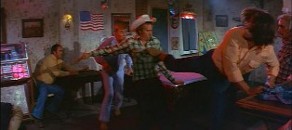
"Nobody
ever went broke underestimating the
taste of the American public." --
H. L. Mencken
Like
a lot of [in]famous film-exploitationeers,
producer Dave Friedman learned the
fundamental tools
of the filmmaking trade in the Army Signal
Corps ... After getting out of the
service, he first got a job promoting for
a carnival, then owned and promoted his
own side-show, and then landed a job as a
press agent for Paramount Pictures' Chicago
office in the early 1950's. That lasted
until the carnie saw-dust in his veins
lured him away from the mainstream to
Modern Films and Kroger Babb -- the
ultimate cinema-barker of his generation. It
was Babb who pioneered the art of
Road-Showing: where the featured forbidden
film was only a small part of the
production. Coupled with a round-table of
speakers, Q&A's, live demonstrations (--
including incidents of shooting at
audience volunteers to prove the
effectiveness of bullet-proof vests),
and pamphlets and How-To guides sold in
the lobby, it was a three-ring, P.T.
Barnum type atmosphere brought into the
hard tops and movie houses. Using
blitzkrieg tactics, advance agents went in first
to inundate the venues with propaganda and
ballyhoo. Then ringers were sent in to
stir up controversy, and some producers
even swore out injunctions to stop their
own shows to amp up the publicity. It was
all about the tease. And the tease was all
about getting more butts into the seats.
Friedman
got in on the tail-end of this type of
road-show, and when Babb decided to call
it quits after touring an Italian version
of Uncle Tom's Cabin (--
that had the production design of Gone
with the Wind
but
a soundtrack where everyone sounded like
Chico Marx),
Friedman bought him out. Needing a new
film to distribute, enter fledgling
filmmaker Herschell Gordon Lewis. And
together, these two hit the ground running
by turning out several cheap but
profitable "Nudie-Cuties" like Lucky
Pierre and Boin-n-g. Sensing
the end of the Nudies was nigh with the
advent of the "Roughie" the duo
switched tactics, kept in the nudity, and
added gallons and gallons of fake gore for
their Blood Trilogy -- Blood Feast,
2000 Maniacs, and Color me Blood
Red. Eventually, though, all that
blood started to curdle and coagulate and
the partnership hemorrhaged out over
creative differences -- Friedman thought
their product needed more polish to
compete for the dwindling exploitation
markets, while Lewis didn't see the need
to lessen the profits by spending any more
money on these no-frills productions.
Leaving
his former partner and Chicago behind
after an amicable split, Friedman moved to
Hollywood, where he found himself a niche
in the late '60s and '70s in the Soft-X
market with fellow sexploitationeers like
Russ Meyer, Lee Frost, and Harry Novak.
And if a major studio needed any kind of
X-rated inserts for their films, Friedman
was the first one they called. But as
hardcore started to catch on and draw less
heat from the authorities, and mainstream
films started to push well past certain
boundaries of decency to never look back,
the specialized markets for Friedman's
films quickly dried up ... The writing on
the wall was obvious, and after enduring a
particularly unpleasant experience with
the financiers of Ilsa: She-Wolf of the
SS, so much so that he had his name
removed from the credits, Friedman knew
the days of the Soft-X were numbered.
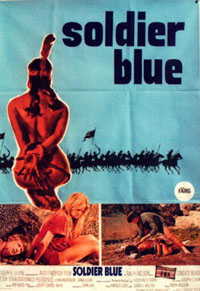 Needing
a new genre to exploit, Friedman
ultimately decided to cash in on the
popularity of some hicksploitation
classics like Walking Tall, and
combine it with the counter-culture
ass-kicking delivered by Billy Jack
... Tom Laughlin's tale about a half-breed
Indian who defends a commune of hippies
against a corrupt sheriff and a bunch of
rednecks was an exclamation point to a
rash of revisionist films that began to
question the Anglo-centric version of the
wild, wild west. More highbrow fair like Little
Big Man tried to tell both sides
fairly, while films like Soldier Blue,
which kinda plays out like a long episode
of F-Troop until the concluding
Peckinpahesque-like massacre of a Native
village, where it suddenly becomes an
atrocity picture as the camera seldom
flinches during the saber-skewering,
raping and pillaging, are a little more
scathing with their message about who were
the real savages. The 1970's saw a glut of
these films, but it was nothing new. You
can trace the Redman's Revenge genre as
far back as the silents, the most famous
being Alan Crosland's Massacre that
really set the template for all that
followed: Needing
a new genre to exploit, Friedman
ultimately decided to cash in on the
popularity of some hicksploitation
classics like Walking Tall, and
combine it with the counter-culture
ass-kicking delivered by Billy Jack
... Tom Laughlin's tale about a half-breed
Indian who defends a commune of hippies
against a corrupt sheriff and a bunch of
rednecks was an exclamation point to a
rash of revisionist films that began to
question the Anglo-centric version of the
wild, wild west. More highbrow fair like Little
Big Man tried to tell both sides
fairly, while films like Soldier Blue,
which kinda plays out like a long episode
of F-Troop until the concluding
Peckinpahesque-like massacre of a Native
village, where it suddenly becomes an
atrocity picture as the camera seldom
flinches during the saber-skewering,
raping and pillaging, are a little more
scathing with their message about who were
the real savages. The 1970's saw a glut of
these films, but it was nothing new. You
can trace the Redman's Revenge genre as
far back as the silents, the most famous
being Alan Crosland's Massacre that
really set the template for all that
followed:
Debuting
in 1934, Massacre was the tale of
Joe Thunderhorse, who had denounced his
heritage by exploiting it for fame and
fortune in several entertainment ventures.
Making his way home for the funeral of his
father -- the chief of the local tribe,
Thunderhorse sees the deplorable
conditions of life on the reservation and
the exploitation of the people by the
entrenched corruption of the bilking
government officials (-- played by
Charles Middleton -- Ming the Merciless!,
and Sidney Toler -- Charlie Chan!).
While trying to put a stop to this legally
with the "White-Man's Law",
Thunderhorse is thwarted at every turn.
And as things escalate, his sister is
brutalized and branded by the bad guys.
That's the last straw for Thunderhorse,
who reclaims his birthright and exacts a
bloody, pre-code revenge. Alas, there is
no happy ending. For as the movie ends,
Thunderhorse, wanted for murder, is a
fugitive from the law and disappears into
the wilderness.
Screenwriter
Wilton Denmark doesn't stray very far from
that template for Johnny Firecloud,
but adds a few tweaks of originality to
seriously muddy the waters on a few
characters. For a director, Friedman
turned to long time collaborator William
Castleman -- who scored almost all of
Friedman's features. And for the grue F/X
for the massacre that was the centerpiece
of this morality play, Friedman borrowed
Joe Blasco from the Ilsa
production, and for a guy known mostly for
doing make-up for situational comedies, he
sure knew how to tear up a body and
slather on the blood. Striking a deal with
20th Century Fox for the foreign
distributions rights -- Friedman's
Entertainment Ventures Inc. would handle
it domestically -- the budget swelled to
$200000, easily the largest budget for any
EVI produced project and it shows on the
screen, most obviously in the quality of
the veteran cast members and the expansive
Cinemascope.
Turns
out Johnny Firecloud was to be
Friedman's first and last shot at
legitimacy. Seeing how badly his
contemporaries were being treated by the
major studios, EVI seriously cut back on
production, and even though he still has
an office in Hollywood, the producer has
since retired back to Alabama ...
According to John McCarty's interview in The
Sleaze Merchants, Friedman claimed
he got out of the business because there
was no business left to be in. "The
whole secret to exploitation ... was the
carnival tease: 'Boy, we didn't get to see
it this week, but next week they're really
gonna show us,'" Friedman says. "With
hardcore, they give away the third act the
minute the curtain is raised; and after
you've seen the guy ejaculate and the girl
fellate him, What else can you do?"
Friedman considered all of this bad show
business, and with the burgeoning X-rated
video market, all the X-rated theaters
closed up, marking the sad end to this
type of filmmaking and promotion.
Was
Johnny Firecloud a worthy capper to
this storied exploitation career? Well,
while it is definitely offbeat, and it has
a few moments of brilliance, you can
already tell that the magic, if not
already gone, was rapidly dwindling
away...
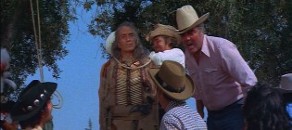
...Back
in the bar, Johnny manages to get a few
good licks in before the odds overwhelm
him. But then, strangely enough, Sheriff
Jesse breaks it up and safely escorts the
bloodied Johnny and White Eagle out of the
bar and lets them go ... Taking his
apologetic father back to the reservation,
the bitter Johnny isn't listening. Once
there, Johnny gets more abandonment grief
from Nenya (Sacheen Littlefeather),
an old friend who came back to the
reservation to help her people as a
teacher. When she
asks Johnny why he came back, he simply
states that he had no where else to go.
The
next day, when Johnny gets word that June
would like to see him, in not the wisest
of moves, he heads out to Colby's ranch,
alone, to find out why she dumped him.
Meeting up in the barn, they fight, but
there's still a spark between them and the
couple do their best to rekindle it by going
for a roll in the hay. Unfortunately, when
Colby catches them in the act, he orders
his men to tie Johnny to the fence and
then proceeds to whip him bloody. Again,
Johnny is saved by the timely intervention
of the Sheriff. But it's Johnny who is
arrested on a trumped-up trespassing
charge and thrown in jail ... While
treating the prisoners wounds, Jesse
confesses that everything Johnny has said
about him was true but there's nothing he
can do to stop Colby. Seems the rancher
found out Jesse was dishonorably
discharged from the army for being a
homosexual -- caught in the act the day
the conflict ended, and the fear of
exposure keeps him turning a blind-eye on
Colby's vendetta. Jesse also tells Johnny
it was Colby who intercepted all the
correspondence while he was away, and
worse, turns out June was pregnant at the
time but lost their baby. He doesn't come
right out and say it, but Johnny's
perceived abandonment and her father's
constant abuse caused the miscarriage.
With
that harsh revelation, Johnny's problems
quickly go from bad to worse when White
Eagle finally sobers up, dons his
ceremonial gear, and goes to Colby to try
and negotiate his son's release. Colby
laughs the old man off at first, but the
Chief's persistence soon ticks him off to the
point that he's suddenly in the mood for
an old-fashioned lynching! Horrified,
Johnny watches from his jail cell window
as his father is stood up in a pick-up bed
and noosed to a tree. A deputy (Jason
Ledger) tries to stop it, but he's
too late as the truck rolls away and the
rope snaps taut. Of course, Colby will
have this written off as an accident,
despite the deputy's protests to the
contrary. Back in the jail, when Johnny
offers his hand in thanks for trying to
save his father, he uses the ruse to knock
out the guard and make his escape.
Fairly
certain that Johnny will come looking for
him, Colby sends out his goons to find him
first and put him in the ground. Figuring
he'd hide out at the reservation, they
don't find Johnny there but do find Nenya
at the school. When she refuses to help
them, things quickly turn sinister as all
six men encircle her, their intentions
clear as they start tearing her clothes
off, and then the gang rape begins in
earnest ... After Johnny finishes off the
customary funeral rights by cremating his
father, he finds what's left of Nenya, who
fingers Colby's men before she dies.
That's the last straw for Johnny, who
swears a blood oath of vengeance, and the
day of deadly reckoning with Colby is now
at hand.
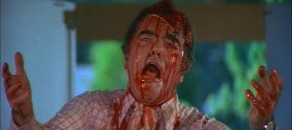
He
starts out by taking care of Colby's goons
first, and dispatches them he does most
gruesomely. The first, the one most
directly responsible for his father's
death, is scalped. The second captured has
a bag filled with rattlesnakes tied around
his head. Number three gets a tomahawk facial,
while the fourth, who initiated the gang
rape, is tied up with a lit bundle of
dynamite strapped between his legs. Boom.
And then there was the guy who appeared to
be masturbating while watching a bunch of
Indians being massacred on the TV. Weird,
weird scene. Anyway, he winds up buried up
to his neck with a mouth full of gravel --
and I'm fairly certain the circling
vultures have already plucked out his eyes
as Johnny leaves him to die.
Experiencing
an extreme amount of pleasure watching
Colby squirm as his men are picked off,
Sheriff Jesse makes a token effort to
track down his fugitive. And that's why
he's nowhere near the ranch when Johnny
catches Colby in the barn alone. And
before he knows what hit him, Colby is
strung up by the neck, and as he tries to
keep breathing, Johnny alternates between
whipping him bloody and punching him in
the junk. But before Johnny can deal a
deathblow, several hired hands stumble
upon them and run Johnny off.

Humiliated,
Colby orders Jesse to bring Johnny in or he'll let
his little secret out
of the closet. Unsure of what to do, Jesse
takes the time to escort June, who has
denounced her father, to the nearest bus
stop. She offers to return and do whatever
she can to help bring her father down; all
Jesse has to do is ask. But will he? Now
completely torn, Jesse presses on and
tracks his fugitive into the familiar
looking desert near Vasquez Rocks (--
ya know, where Captain Kirk fought the
Gorn), and when he finally catches
up to him, the two men trapped in Colby's
web of hate face off for one final
showdown...
The
End?
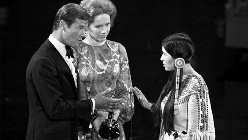 When
Marlon Brando sent Sacheen Littlefeather
to refuse his Academy Award for The
Godfather, he wanted to draw attention
to the American Indian Movement's current
efforts during the Siege
at Wounded Knee and protest Hollywood's
propagating the mistreatment of Native
Americans in film. His sentiments
might have been genuine, but his chosen
representative was not. In fact, it
only added another sad chapter in
Hollywood duplicity ... Ms. Littlefeather,
whose real name is Maria Cruz, was an
actress/model of Hispanic descent, and her
showbiz debut came when she was a finalist
for the Miss American Vampire
contest held by Dan Curtis to help promote
House of Dark Shadows, the feature
film version of his gothic soap opera. And
less than six months after her abbreviated
Oscar appearance in '73, Hugh Hefner had
her posing nude for a pictorial in the
October issue of Playboy.
And that, along with a few bit-parts in
several features, and one hideous,
gravity-defying boob-job, brought her to
Friedman's attention, who had no qualms
about exploiting her notoriety to promote
his film -- even though her role, when not
counting the pivotal rape/murder scene, is
probably less than a minute of screen
time. When
Marlon Brando sent Sacheen Littlefeather
to refuse his Academy Award for The
Godfather, he wanted to draw attention
to the American Indian Movement's current
efforts during the Siege
at Wounded Knee and protest Hollywood's
propagating the mistreatment of Native
Americans in film. His sentiments
might have been genuine, but his chosen
representative was not. In fact, it
only added another sad chapter in
Hollywood duplicity ... Ms. Littlefeather,
whose real name is Maria Cruz, was an
actress/model of Hispanic descent, and her
showbiz debut came when she was a finalist
for the Miss American Vampire
contest held by Dan Curtis to help promote
House of Dark Shadows, the feature
film version of his gothic soap opera. And
less than six months after her abbreviated
Oscar appearance in '73, Hugh Hefner had
her posing nude for a pictorial in the
October issue of Playboy.
And that, along with a few bit-parts in
several features, and one hideous,
gravity-defying boob-job, brought her to
Friedman's attention, who had no qualms
about exploiting her notoriety to promote
his film -- even though her role, when not
counting the pivotal rape/murder scene, is
probably less than a minute of screen
time.
As
I said before, Johnny Firecloud almost
succeeds as an offbeat gem on the evils of
bigotry -- but that's mostly due to the
homophobic aspects, thanks to Canary's
understated performance, and not the
racial hatred. On the Native American
front, it makes no great strides and
ultimately sputters and fails, falling
into the same old genre trappings; the
Natives here are played by a Puerto Rican (Johnny),
a Mexican (Nenya), and an
Italian (White Eagle) -- and
come to think of it, I'm almost positive
that these are the only three Indians we
ever see during the entire film. I mean,
is Colby just picking on Johnny or what?
And the whole revenge angle is stretched a
little thin because, frankly, after your
lover has been abused and brow-beaten into
miscarrying your child, your father has
been humiliated and lynched, and your best
friend has been brutally raped and
murdered, and then, and only then, after
all of that sequentially happens,
do you take the law into your own hands
for a little biblical payback, as a
viewer, you might have a little trouble
rooting for the guy because you have to
wonder out loud -- What in the hell
took you so damn long?
For
the record, I have this same
justification problem with almost all
revenge flicks. Seriously, Mr. Kersey,
did you have to wait until your new
girlfriend died, AGAIN!, before taking
out the local kingpin?
And
then there's that abortive ending. Most
people hate it because the vile Colby is
still breathing when the end credits roll.
As for myself, though I found it a bit
anti-climatic, I really didn't hate it but
I wasn't really sure what they were
shooting for, either. After one last
heated exchange, Jesse, feeling guilty and
culpable, winds up letting Johnny go. Now,
there's a lot left to your own
interpretations as these two oppressed men
shake hands and part, and the fugitive
Firecloud disappears into the mountains,
but I'm fairly certain that Jesse is gonna
come out of the closet and call in the
Feds, and then turn evidence on Colby for
all the wrong he's done. And yes, Colby is
still alive, but he's been beaten and
humiliated -- by an Indian! a fate worse
than death to him -- his only child has
left and disowned him, and his cronies are
all dead, leaving him to take all the heat
when the authorities come a-knocking, so
his suffering is just beginning. And in
the end, Johnny will probably get one more
lingering death to notch on his tomahawk.
Maybe. But with everything we've seen,
probably not. Which leaves us with the
distinct possibility that this massacre
was all for nothing. So nobody wins.
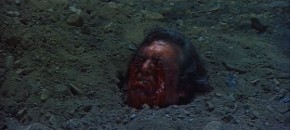
Uhm
... Yay.
Like
always, Something Weird Video's DVD for Johnny
Firecloud is jammed-packed with bonus
material; trailers, shorts, and
exploitation art is all there just waiting
to be cued up. Saddled on a double-feature
disc with the aptly titled Bummer!
-- whose tagline screams "You
don't have to assault a groupie...You just
have to ask!" that's the
cinematic equivalent of chewing on a piece
of aluminum foil, the DVD also contains a
commentary by Friedman, Mike Vraney and
Frank Henenlotter for Johnny Firecloud.
And thanks to the efforts of the
commentators, it is filled with a lot of
insider information by Friedman -- on Ilsa:
She-Wolf of the S.S. ... E'yup, about
90% of it dealt with the German Über-[rhymes
with twitch]. Informative, yes, but kinda
of a wash for this particular disc. The
only interesting bit about Firecloud
was the revelation that in all probability
-- the 20th Century Fox logo and opening
fanfare instead of the Entertainment
Ventures Inc. title card being the dead
giveaway -- that SWV might have
accidentally released the tamer,
International Fox cut of the film by
mistake. Several times in the commentary
Friedman claims there are some skin-shots
missing, and some of the violence appears
to have been altered slightly or abruptly
abbreviated in spots.
Whatever
version, in the end, Johnny Firecloud
is probably nothing you haven't seen
before in a standard revenge flick. But,
with all due respect to Mr. Friedman and
EVI, it is a lot better than it probably should
be once you consider who was behind it.
Faint praise? Well, just try and sit
through Bummer! and you'll see what
I mean. It's rare when a feature can
escape its schlocky trappings and achieve
to something far beyond its limitations. Johnny
Firecloud's ambitions probably weren't
that high, but they were definitely met
and exceeded.
|